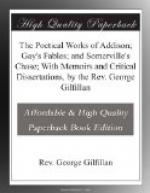Gay shortly after wrote his “Fan,” and his “Trivia, or the Art of Walking the Streets of London”—the former a mythological fiction, in three books, now entirely and deservedly neglected; the second still worthy of perusal on account of its fidelity to truth, in its pictures of the dirty London of 1713—a fidelity reminding you of Crabbe and of Swift; indeed, Gay is said to have been assisted in “Trivia” by the latter, who, we may not uncharitably suppose, supplied the filth of allusion and image which here and there taints the poem. In 1713, our author brought out on the stage a comedy, entitled the “Wife of Bath,” which met with no success, and which, when reproduced seventeen years later, after the “Beggars’ Opera” had taken the town by storm, fell as flat as before.
Gay had now fairly found his way into the centre of that brilliant circle called the Wits of Queen Anne. That was certainly one of the most varied in intellect and attainment which the world has ever seen. Highest far among them—we refer to the Tory side—darkled the stern brow of the author of “Gulliver’s Travels,” who had a mind cast by nature in a form of naked force, like a gloomy crag without a particle of beauty or any vegetation, save what will grow on the most horrid rocks, and the condition of whose existence there, seems to be that it deepens the desolation—a mind unredeemed by virtue save in the shape of remorse—unvisited by weakness, until it came transmuted into the tiger of madness—whose very sermons were satires on God and man—whose very prayers had a twang of blasphemy—whose loves were more loathsome than his hatreds, and yet over whose blasted might and most miserable and withered heart men mourn, while they shudder, blend tears with anathemas, and agree that the awful mystery of man itself is deepened by its relation to the mystery of the wickedness, remorse, and wretchedness of Jonathan Swift. Superior to him in outward show and splendour, but inferior in real intellect, and, if possible, in moral calibre, shone, although with lurid brilliance, the “fell genius” of St John or Henry Bolingbroke. In a former paper we said that Edmund Burke reminded us less of a man than of a tutelar Angel; and so we can sometimes think of the “ingrate and cankered Bolingbroke,” with his subtle intellect, his showy, sophistical eloquence, his power of intrigue, his consummate falsehood, his vice and his infidelity as a “superior fiend”—a kind of human Belial—
“In
act more graceful than humane:
A fairer person lost not heaven:
he seem’d




